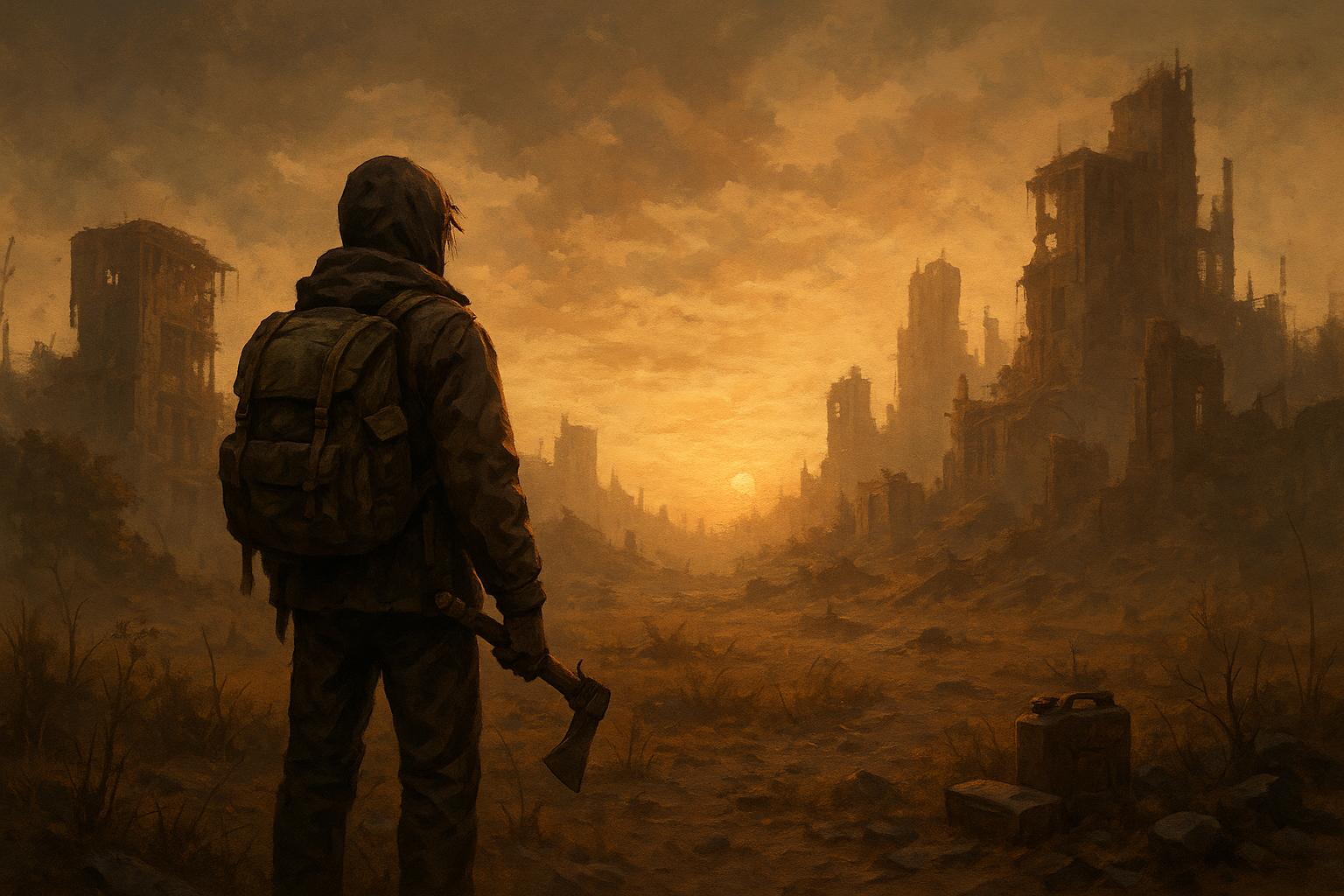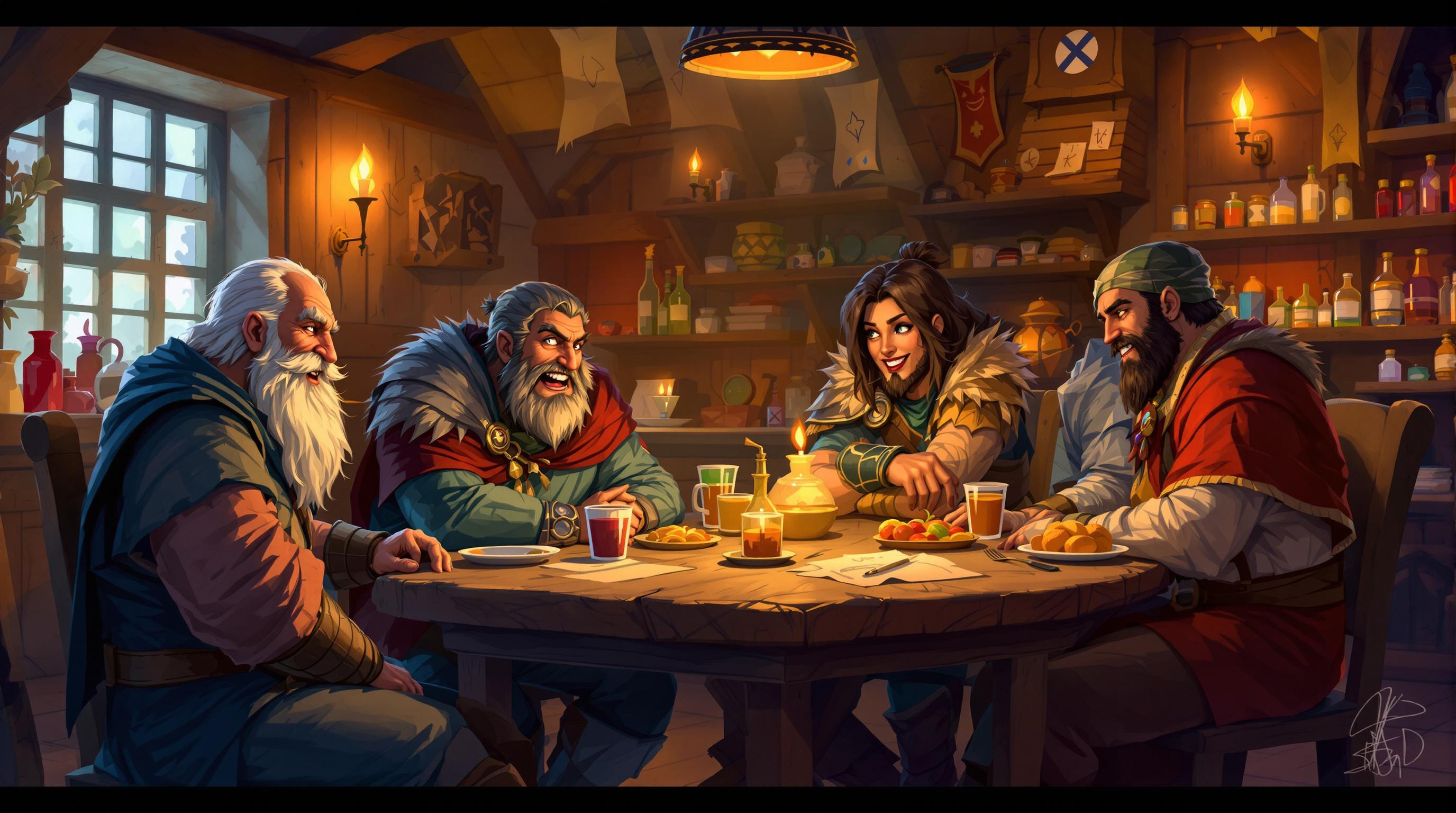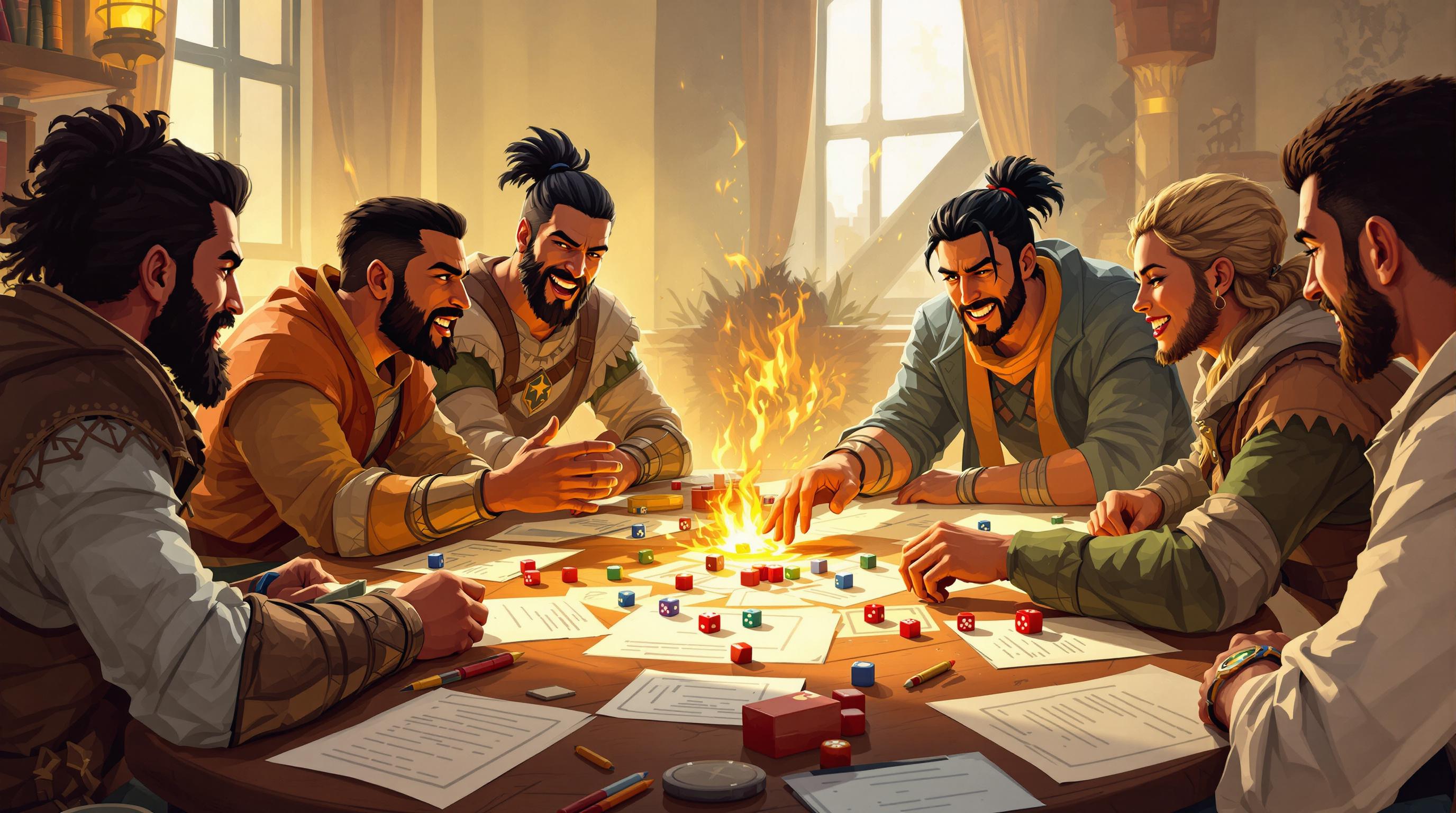Powered by the Apocalypse (PbtA) games are tabletop role-playing games (TTRPGs) that focus on storytelling and collaborative play. They use simple mechanics - rolling two six-sided dice - to resolve actions, making them accessible and narrative-driven. Here’s a quick overview of the standout PbtA games:
- Apocalypse World: The original PbtA game set in a gritty, post-apocalyptic world. It emphasizes player-driven stories, GM flexibility, and dynamic character roles.
- Dungeon World: A fantasy-themed adaptation of PbtA, blending traditional dungeon crawling with shared storytelling.
- Legacy: Life Among the Ruins: A generational post-apocalyptic game where players guide families and communities over time.
- Monster of the Week: Inspired by supernatural TV shows, this episodic game focuses on mystery-solving and monster hunting.
- Monsterhearts 2: A game of supernatural teen drama, exploring relationships, identity, and emotional conflicts.
Quick Comparison
| Game Title | Genre/Theme | Key Features | Ideal For |
|---|---|---|---|
| Apocalypse World | Post-apocalyptic | Gritty setting, player-driven choices, GM moves | Fans of collaborative, intense storytelling |
| Dungeon World | Fantasy | Familiar archetypes, shared storytelling | Fantasy RPG players seeking narrative focus |
| Legacy | Generational post-apocalypse | Multi-scale play, long-term world-building | Groups interested in epic, evolving campaigns |
| Monster of the Week | Supernatural investigation | Episodic format, mystery-solving mechanics | Fans of shows like Buffy or Supernatural |
| Monsterhearts 2 | Supernatural teen drama | Emotional depth, relationship-driven gameplay | Players who enjoy character-driven storytelling |
Each game tailors the PbtA system to its genre, offering unique experiences while staying true to the system's narrative focus. Whether you're into gritty survival, fantasy adventures, or supernatural drama, there’s a PbtA game for you.
Five Best RPGs Powered by the Apocalypse
1. Apocalypse World: The Original PbtA Game
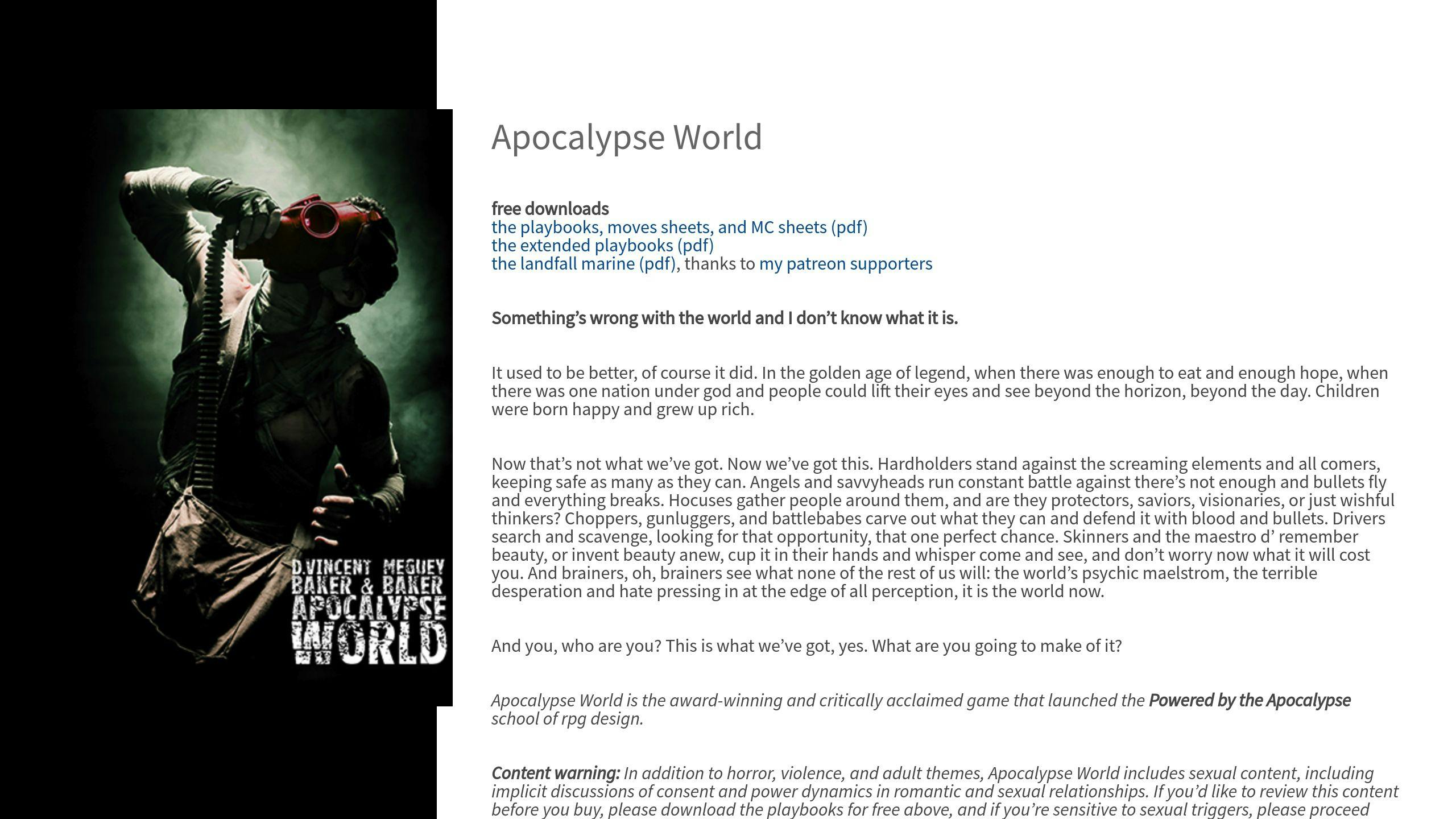
Apocalypse World is the game that kickstarted the Powered by the Apocalypse (PbtA) system, laying the groundwork for storytelling-focused tabletop RPGs. Set in a harsh, post-apocalyptic world, this RPG reshaped how players and GMs approach collaborative storytelling.
Core Mechanics and Gameplay
The game introduced the concept of 'Moves,' where character actions trigger specific narrative outcomes based on dice rolls. This keeps the gameplay fast-paced and focused on the story, steering clear of overly complicated rules [1][2].
The Role of the GM
In Apocalypse World, the GM acts as a guide, using 'GM Moves' to shape the story and keep the tension alive. This approach ensures a balance between player freedom and narrative structure [3].
"When a real cause has a fictional effect, that's what holds the roller coaster up." - Vincent Baker, creator of Apocalypse World [5]
Player Involvement in the Story
The game boosts player engagement with mechanics like 'Hold,' which lets players collect points to influence outcomes. This adds a strategic element to the gameplay. Additionally, Character Playbooks give players defined narrative roles, ensuring everyone has a unique impact on the unfolding story [4].
Variations and Accessibility
For those who prefer a less intense setting, Apocalypse World: Burned Over Hackbook offers the same mechanics but with themes that are easier to approach [4].
With its dynamic systems and emphasis on meaningful player choices, Apocalypse World has become a landmark in narrative-driven RPGs. It set the stage for the PbtA system and inspired other games like the fantasy-themed Dungeon World [5].
2. Dungeon World: Fantasy Role-Playing with PbtA
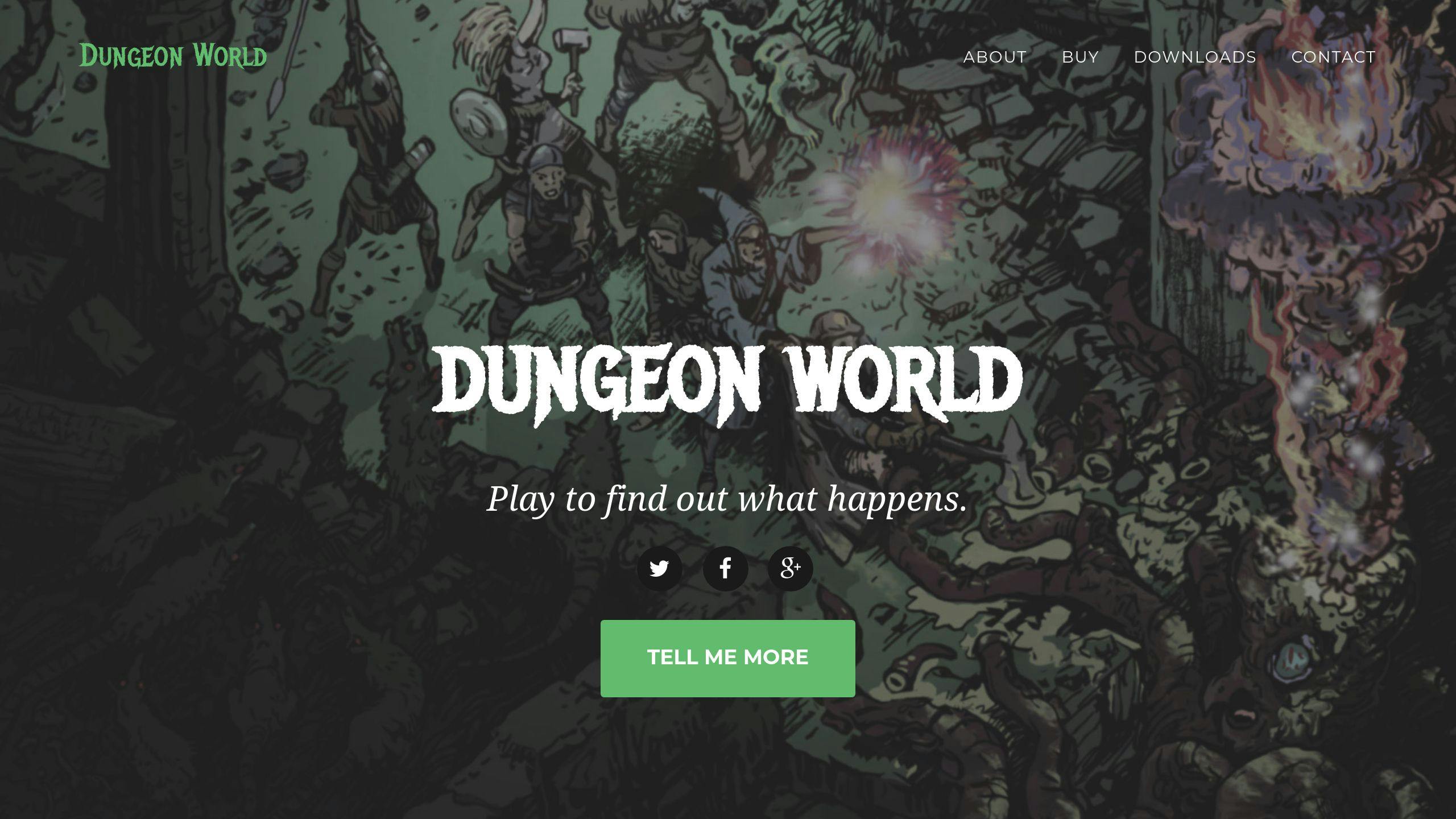
Inspired by Apocalypse World, Dungeon World brings the Powered by the Apocalypse (PbtA) system into the realm of fantasy, combining familiar elements of the genre with modern, story-driven mechanics.
Mechanics and Gameplay
At its core, Dungeon World uses the well-known 2d6 roll system. Outcomes are influenced by modifiers and tailored character moves, which reflect classic fantasy archetypes. For example, a wizard’s spellcasting or a rogue’s quick thinking are seamlessly integrated into gameplay mechanics [1].
Collaborative Storytelling and Player-Driven Adventures
Dungeon World shifts away from the GM-dominated structure of many RPGs. Instead, it emphasizes shared storytelling, where both players and the GM contribute to shaping the narrative. This approach works equally well for combat-focused dungeon crawls or more character-centered plots, making it a great fit for groups moving from traditional RPG systems [3].
GM Role and Narrative Flow
Game Masters in Dungeon World follow guiding principles that encourage improvisation. Instead of crafting detailed storylines, GMs react to player decisions with moves designed to keep the story moving and engaging. This method ensures a dynamic and ever-evolving adventure [3].
3. Legacy: Life Among the Ruins - Post-Apocalyptic Storytelling
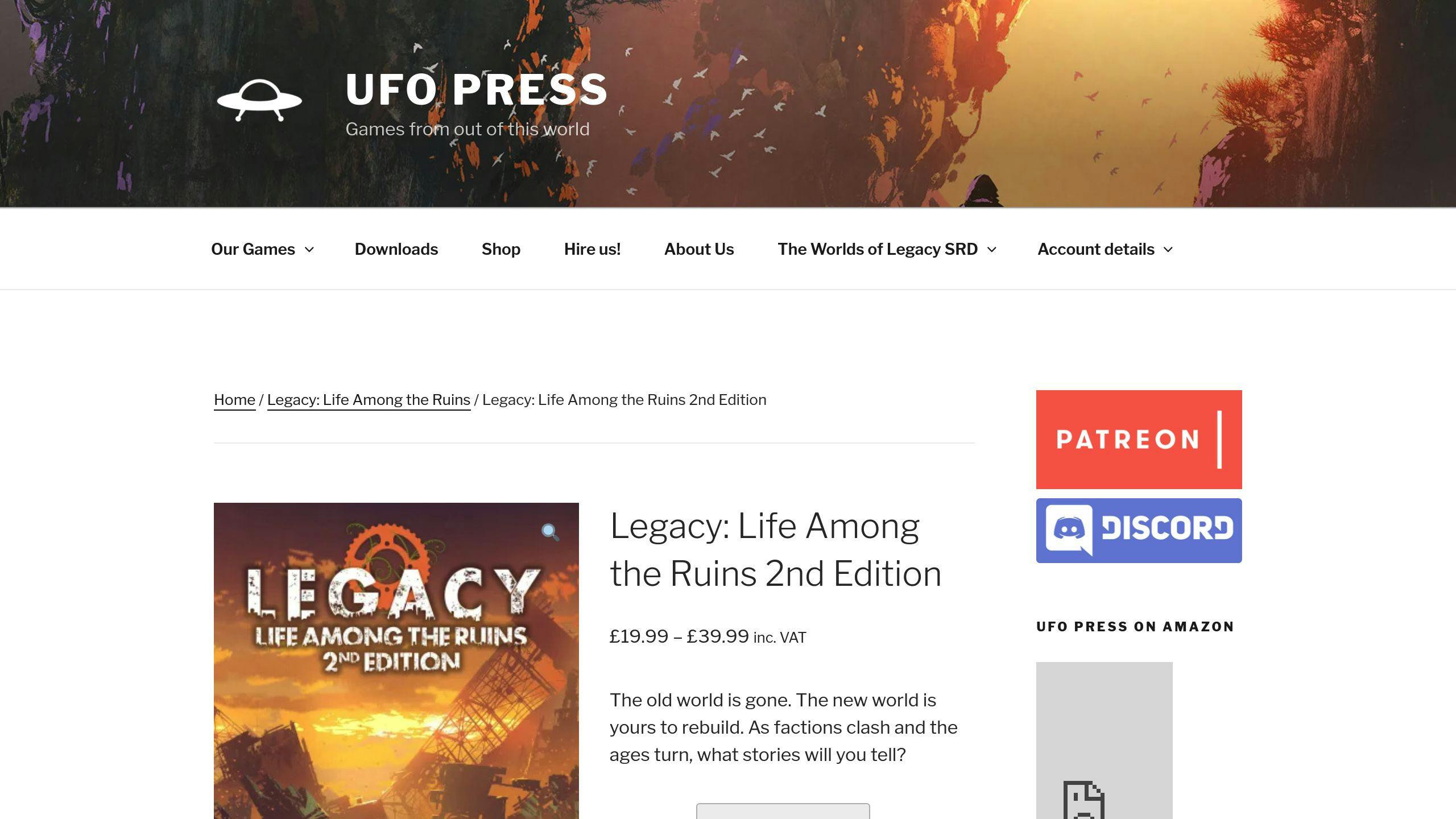
Legacy: Life Among the Ruins, created by Jay Iles and released by Modiphius Entertainment in 2018, takes the Powered by the Apocalypse (PbtA) system in a new direction. It focuses on generational gameplay, where the choices you make shape a shared post-apocalyptic world over time.
One of the game's highlights is its "family playbooks." These allow players to guide family lines through generations, influencing their traditions, resources, and relationships. It's a game where your decisions leave a lasting imprint on the world.
Gameplay Structure
| Level | Description |
|---|---|
| Family Scale | Oversee resources, territories, and inter-family dynamics for long-term survival. |
| Character Scale | Dive into personal stories and tackle immediate challenges for short-term growth. |
Layers of Gameplay and Accessibility
Legacy introduces a rich layer of generational storytelling while keeping things approachable. Its structured world-building and clear rules make it easier to dive into its complex themes.
Collaborative Storytelling at Its Core
What makes Legacy stand out is its focus on collaborative storytelling. Players work together to build a multi-generational narrative, creating a world that evolves with every decision. This approach allows for a variety of storylines while keeping the world cohesive.
"Legacy is about the long-term survival of your family, and the stories that get passed down through generations." - Jay Iles
Legacy showcases how the PbtA system can handle expansive, multi-generational narratives. It offers a fresh perspective on post-apocalyptic worlds, focusing on survival and its ripple effects over time. Up next, Monster of the Week takes us in a completely different direction, diving into episodic monster-hunting adventures filled with mystery and action.
sbb-itb-b8b00a5
4. Monster of the Week: Mystery and Monster Hunting
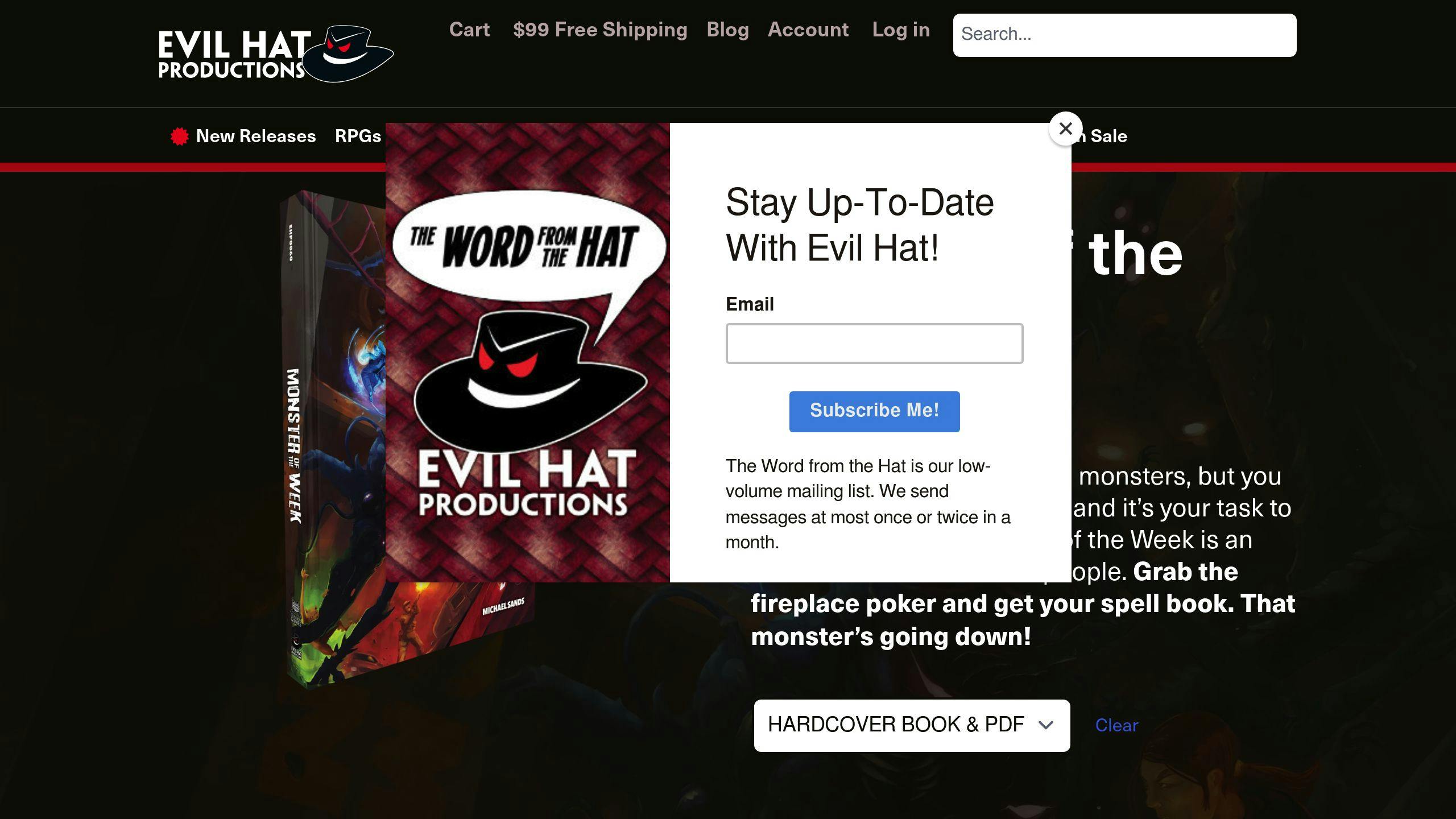
Created by Michael Sands and published by Evil Hat Productions, Monster of the Week uses the PbtA system to deliver supernatural investigation adventures. Inspired by shows like Supernatural and Buffy the Vampire Slayer, it combines mystery-solving with action-packed monster hunts.
Core Gameplay Elements
Each session feels like its own episode, making it ideal for both one-shots and longer campaigns. The game mirrors the episodic storytelling style of its TV inspirations.
| Gameplay Aspect | Description |
|---|---|
| Investigation Moves | Tools to uncover and piece together clues |
| Combat Encounters | Dynamic battles with supernatural foes |
| Character Types | Distinct hunter archetypes to choose from |
| Mystery Structure | Episodic adventures with clear story arcs |
Mystery-Solving Mechanics
The game uses a 2d6 dice system paired with the 'Sharp' stat to help players uncover clues and advance the story [2]. This mechanic keeps the investigation flowing smoothly while maintaining a sense of suspense.
Collaborative Storytelling
Teamwork is at the heart of Monster of the Week. Players work together to shape the narrative, solve mysteries, and make decisions that drive the story forward. The Game Master sets the stage with situations and prompts, but the players' choices steer the action, ensuring every session is distinct [3].
Broad Appeal and Themes
The game’s structure supports a wide range of supernatural themes, from eerie horror to urban fantasy. Its episodic format makes it accessible for newcomers while still engaging experienced players. Whether you're hunting werewolves or investigating ghostly phenomena, there’s something for everyone.
Like all PbtA games, Monster of the Week adjusts to the group's storytelling preferences, creating a tailored experience every time. While this game emphasizes action and mystery, others like Monsterhearts 2 focus on supernatural drama and relationships, offering a different kind of emotional depth.
5. Monsterhearts 2: Drama and Relationships in a Supernatural Setting
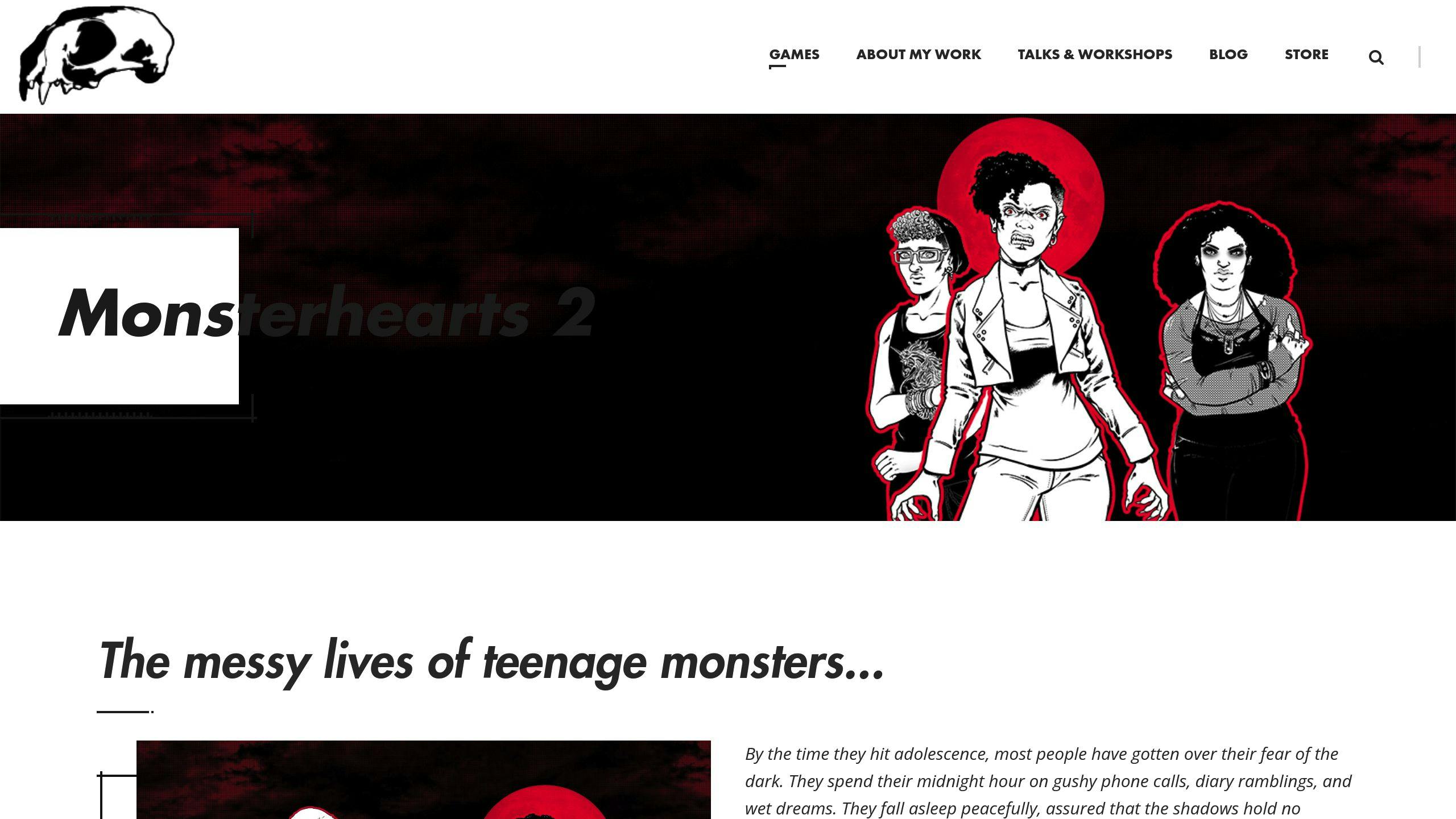
Part of the Powered by the Apocalypse (PbtA) system, Monsterhearts 2 takes a different path from action-focused games like Monster of the Week. Designed by Avery Alder, it dives into supernatural teen drama and the complexities of relationships.
"The game is about the messy lives of teenagers who are also monsters" [1]
Core Mechanics and Emotional Focus
Monsterhearts 2 introduces mechanics like strings and conditions to track emotional ties and states. These mechanics fuel the drama and conflicts that define the game.
| Mechanical Element | Purpose | Impact on Play |
|---|---|---|
| Strings | Track emotional leverage between characters | Create lasting consequences |
| Basic Moves | Resolve common interactions and conflicts | Drive dramatic scenes |
| Character-Specific Moves | Highlight unique supernatural powers | Tie powers to emotions |
| Conditions | Reflect emotional states | Influence decisions |
Supernatural Themes and Emotional Conflict
In Monsterhearts 2, supernatural abilities are intertwined with emotional struggles. A character’s powers often emerge from their feelings, adding layers of tension to personal conflicts and relationships [1][4]. Secrets and supernatural elements amplify the drama, making every interaction more intense.
Exploring Identity Through Playbooks
The game offers a variety of supernatural playbooks, each designed to explore aspects of teenage life through a supernatural perspective [2]. These playbooks serve as templates for characters, allowing players to delve into themes of identity, belonging, and transformation while navigating both mundane and supernatural challenges.
Collaborative Storytelling at Its Core
Monsterhearts 2 emphasizes collaborative storytelling. The GM sets up dramatic situations, but it’s the players’ decisions that shape the emotionally charged, character-driven story. The supernatural backdrop enriches relatable experiences like first love, betrayal, and self-discovery [1][3].
This game stands out as a PbtA title that prioritizes personal and emotional storytelling, offering a unique take on supernatural roleplaying.
Comparison of Features and Drawbacks
Each PbtA game has its own strengths and challenges, appealing to different player preferences and storytelling styles. Here's a breakdown of how these games compare across key aspects:
| Game Title | Strengths | Potential Drawbacks | Ideal For |
|---|---|---|---|
| Apocalypse World | - Introduced the PbtA framework [1][4] - Strong narrative mechanics - Flexible storytelling system |
- Steep learning curve for new GMs | Players who enjoy gritty, collaborative storytelling |
| Dungeon World | - Familiar fantasy elements [1] - Works well with traditional RPG styles - Clear character progression |
- Lacks the mechanical depth of traditional fantasy RPGs | Fantasy RPG players exploring narrative-driven systems |
| Legacy: Life Among the Ruins | - Multi-generational storytelling - Emphasizes community building - Engaging world-building mechanics [1] |
- Requires complex, long-term planning | Groups looking for epic, long-form campaigns |
| Monster of the Week | - Structured mystery framework - Clear GM guidelines - Episodic format [1] |
- Can feel repetitive over time | Fans of supernatural investigations and mystery-solving |
| Monsterhearts 2 | - Focuses on emotional depth - Strong relationship dynamics - Supernatural themes [1][3] |
- Mature themes may not suit all groups - Drama-heavy, less action-oriented |
Players who enjoy character-driven, dramatic narratives |
These comparisons can help you choose the game that best suits your group's style and interests. Each title builds on the PbtA system's foundation, emphasizing storytelling, player agency, and collaborative world-building.
The PbtA framework thrives on narrative-driven gameplay, where simple dice rolls resolve actions. Each game tailors these mechanics to its genre, creating distinct experiences while staying true to the system's core. However, GMs coming from traditional systems might need to shift their approach, focusing on guiding the story rather than controlling it.
Final Thoughts
The Powered by the Apocalypse (PbtA) system has reshaped the world of tabletop role-playing games by offering a simple yet versatile framework that works across various genres. Its mechanics - centered around 2d6 rolls and genre-specific Moves - strike a balance between ease of use and narrative complexity. This combination has made PbtA games a go-to choice for players who enjoy collaborative and story-driven gameplay [5][6].
With more than four dozen licensed PbtA games available, the system's reach is undeniable [7]. Each game builds on the groundwork laid by Apocalypse World while introducing fresh ideas tailored to its genre. For example, Monster of the Week embraces episodic storytelling, while Legacy explores themes of generational change. These games highlight how PbtA's core mechanics can support a wide range of storytelling approaches [3].
The system's GM style, which relies on a back-and-forth question-and-answer format, allows players to actively shape the narrative. This dynamic interaction has changed how players and GMs collaborate, encouraging a shared sense of responsibility in crafting the story [3].
As designers continue to experiment within the PbtA framework, its influence only grows. Whether you're into gritty post-apocalyptic tales or supernatural mysteries, PbtA offers something for every type of storyteller. It remains a game-changer in the realm of narrative-focused tabletop gaming.
